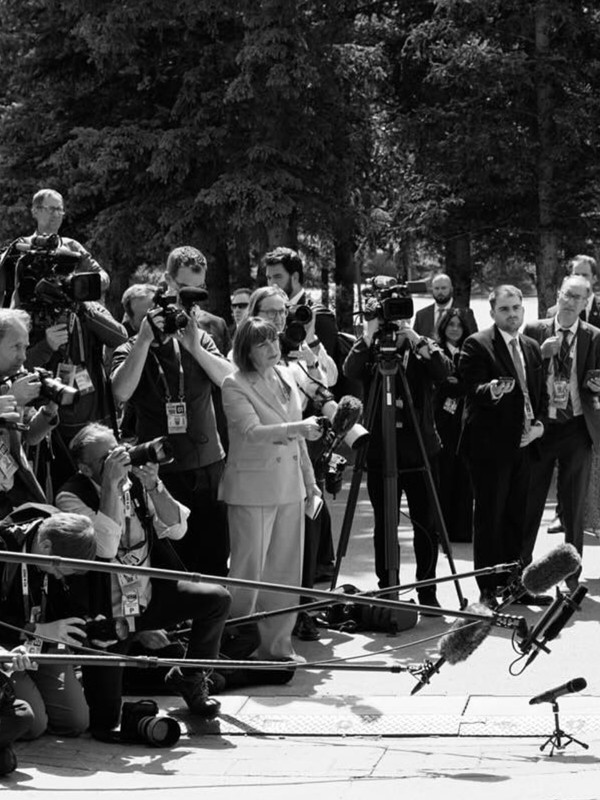13 Tricky Interview Questions & How To Nail Them
1. Tell me about yourself…
This is likely to be one of the first questions you’re up against. To be clear: this isn’t a chance to tell the recruiter your life story. This is an opportunity to shout about your skills. “Typically, candidates can respond to this too modestly, but for a recruiter, this question is attempting to open the floor to you,” advises Kate Allen, Managing Director of recruitment agency Allen Associates. “This is the time to sing your praises, shout about your achievements and let them know the 10 reasons why they should hire you. Don’t be shy.”
2. How do you handle pressure?
This is a big one, particularly if you’re going for a managerial position. When the proverbial hits the fan, companies want to know that employees can handle the stress with grace and ease. “In your response to this question, give an example of a time you were under pressure that’s rich in details and describes a thoughtful reaction to a situation that would challenge most people,” Roy Cohen, author of The Wall Street Survival Guide tells Glassdoor.
3. Why are you interested in working here?
“This is where the true test of ‘Has this candidate done their research’ comes in,” Kate warns. “A lack of research before a job interview can be completely detrimental to your whole interview. If a company is going to invest in you, they want to know if you are also invested. Simple.”
She advises investigating the team, their company culture and ethos prior to your interview. “Not only are these three direct answers to the above question, but they will also allow you to be sure that this is where you want to work, which, in turn, will shine through in your interview.”
4. What can you offer us that someone else can’t?
So you’ve made it this far, but now you have to make yourself stand out among the sea of other candidates being interviewed. To do this, clearly articulate what you want to be remembered for. “Include a specific example that demonstrates the competencies and characteristics you want to highlight,” careers advisor Mary Grace Gardner says. “Stay away from trite responses, such as ‘I'm a hard worker', or your education (unless you’ve had some sort of specialised training you know no one else would have).”
5. If you called your boss right now and asked them what area you could improve on, what would they say?
“Show that you believe in growing professionally and are not afraid to admit you’re not perfect,” says careers expert Aurora Meneghello. “The key here is to share an area you need to improve on that’s not critical for what you’re applying for. Once you’ve shared your weakness, immediately follow it up with how you’re actively invested in improving upon it.”
6. What are some of your leadership experiences?
No matter what kind of experience you have, whether you’re senior or entry level, come with an example prepared. “Select one example that demonstrates why you stepped into a leadership role for a project or situation, what you did as the leader and what impact it had on others and yourself,” advises Gardner. “The best answers include what goal you set, how you rallied the team to achieve that goal and how you applied those learnings elsewhere.”
7. What’s your biggest failure?
It’s key to understand that with this question, interviewers aren’t trying to pinpoint your failures, but rather are attempting to get a realistic image of you as a candidate. Everyone has weaknesses – they want to see if you can learn from them. “The key here is to choose something you learned and bounced back from,” says Meneghello. “Share something authentic and express how you felt, the impact it had on you or the project, how you got up again and what you did differently the next time around.”
8. Why do you want to leave your current job?
If this one comes up, don’t panic. “This is one of the hardest questions in the book,” says Kate. “There is a common misconception that this question is asked to catch you out and reveal the real ugly truth as to why you’re making a career move. Truthfully, for a recruiter, this question is an essential technique, so as not to lose you in the final stages of the process. If you don’t have a solid reason to leave your current job, chances are you won’t.”
So, how exactly do you answer it? Well, use it as the prime opportunity to be completely honest: “Whilst talking negatively about your previous company is generally frowned upon, admitting that you’re not progressing quickly enough, or that you don’t enjoy the team dynamic, for example, are really vital components for you to be happy at work, and you should be honest about them,” Kate advises. “Ultimately, the hiring professional is interested in your long-term goals, and therefore maximising your enjoyment of the job. If you’re not completely happy in your current role, that’s okay – let’s get you happy in your next.”
9. Tell me about a time when you disagreed with your boss…
Again, this isn’t a trick question to see if you have a disagreeable character or a short temper – it’s examining your diplomatic nature and courage to speak up. “If your boss is making a major mistake or you have an even better idea, they will definitely want you to speak up – but it would be important to do it the right way,” careers advisor Mary Grace Gardner says. But remember, you’re not trying to make your boss look bad. Careers coach Angela Copeland says that interviewees should “use an example that illustrates a disagreement where you were able to persuade your boss to try things your way – and ultimately, it worked out well for everyone, including your boss.”
10. Where do you see yourself in five years?
Don’t feel as though you need to answer with “In your company, in X position” – the interviewer will know you’re saying it to keep them happy, assuring them you’ll be there for the long term. But Kate advises that this isn’t necessarily a business question. “A job interview is about you,” she says. “Let the interviewer know exactly where it is you see yourself personally as well as professionally. This question is generally to see how ambitious you are, and your personal goals matter too.”
11. What salary are you looking for?
Money always makes people feel awkward, which makes it a pretty a taboo subject. However, a degree of transparency between parties is needed in an interview. “There really is no reason to feel uncomfortable when voicing what is it you would like in terms of remuneration,” Kate says. “Don’t forget that an interview is give and take. What can you bring to the company versus what you want to be paid to bring those skills.”
When it comes to giving a figure, she says you need to be honest – and realistic. “HR professionals have a great deal of knowledge on job roles, salaries and competitors, so if your aim is to overinflate your current salary to secure a bigger one in your next role, you may well just get found out.”
12. Why are you interested in working for us?
Glassdoor offers a few insights into what not to say:
- I think this job is a good stepping stone for my career
- I want to work here for the prestige
- I heard the work-life balance and compensation are great
Instead, share strategic or operational reasons that you’re interested in the company (e.g. “I think your technology is the future of the industry”) and also cultural reasons (e.g. “I love how much you value training and development”).
13. What questions do you have for me?
“This is one of, if not the most important question during the interview process,” Aurora of Repurpose You Purpose tells Glassdoor. “[It shows] that you researched the company in detail and are at the interview to learn more.”
Nicole Wood from career coaching service Ama La Vida says to ask the interviewer the following:
- I read about the XYZ initiative online. Can you tell me more about it and how it relates to the work your team is doing?
- What type of people tend to excel here?
- How would you describe the culture here?
Visit Glassdoor.com for more information.
DISCLAIMER: We endeavour to always credit the correct original source of every image we use. If you think a credit may be incorrect, please contact us at info@sheerluxe.com.






